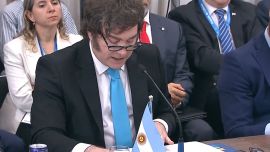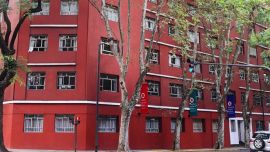THE WEEK IN CORONAVIRUS
There were 4,374,587 confirmed cases of coronavirus contagion and 91,979 deaths at press time yesterday as against 4,242,763 cases and 88,247 deaths the previous Friday. The good news was that intensive care bed occupancy is now down to around 7,200 as against almost 8,000 earlier this month. Uncertainty over the second dose of Sputnik V vaccine massively due in the next few weeks was a dominant theme last week with President Alberto Fernández mocking critics as clamouring for “a second dose of venom” while health authorities began evaluating the use of alternative vaccines as Moscow gives priority to Russian needs. Anxiety over the advent of India’s Delta variant was another subtext. Good news and bad news on Tuesday – the latter was the death toll topping the 90,000 mark with a record 792 fatalities after 68 weeks of pandemic while the former was an epidemiological green light extended to 10 of the 59 Buenos Aires Province districts denied classroom education until now, including the major cities of Mar del Plata and Bahía Blanca. Tuesday’s record dead included a well-known name, Horacio González, 77, former National Library chief and founder of the ultra-Kirchnerite Carta Abierta intellectual grouping, after five weeks in intensive care. City Hall was a day ahead of the rest of the country in announcing the latest easing of restrictions on Thursday with secondary schools, gyms and bars all re-opened for indoor use if occupancy is limited to 30 percent of capacity while places of worship and theatres are now permitted to be half full with no limits for outdoor sports – these relaxations were made possible by the daily caseload descending from 2,700 to 1,200 in the course of the month, Mayor Horacio Rodríguez Larreta told a press conference. But the ban on indoor social activities will continue, as will a virtual curfew between midnight and 6pm. The president looked set to extend his existing DNU detailing measures at press time, though with a reduction in the number of people allowed into the country each day.
PARIS CLUB DEAL
Argentina will pay the Paris Club US$430 million of the US$2.4 billion falling due last May at the end of July, thus averting default and obtaining a reprieve until next March (when a further payment will be made), Economy Minister Martín Guzmán announced on Tuesday. A major factor and imponderable in this equation will be whether an agreement with the International Monetary Fund (IMF) is in place by next March since the Paris Club has made that a condition for a final settlement. Guzmán pledged to discontinue the practice of paying some creditors (such as China) and not others (Paris Club members).
BEEF DEAL
The new scheme governing beef exports was announced by Productive Development Minister Matías Kulfas on Tuesday, four days after the preceding month-long ban had expired. The ban is partially eased to permit half the monthly average of last year’s exports except seven mass consumption cuts whose sale abroad will continue to be prohibited for the rest of the year – this new scheme will run until the end of August. For the longer term a plan to boost beef production from the current 3.2 to five million tons (with three million tons reserved for the domestic market) will be announced over the next month. Rancher lobbies criticising the announcements argued that this goal was unattainable unless a total liberation of exports provided the incentive of earnings in hard currency. The announcements followed a Casa Rosada meeting between farming leaders and President Alberto Fernández, who told them that he disagreed with export bans but the need to lower “unsustainable” beef prices by restricting supply to local demand left him no choice as a “temporary, cyclical” measure. Last year Argentine exported 900,000 tons of beef, earning US$2.7 billion, which now stands to be reduced by US$1.2 billion, according to a farming think tank.
(SUBFRONTIER) MARKET WATCH
Argentina was downgraded from emerging market to “standalone” status by MSCI (Morgan Stanley Capital International) credit rating agency on Thursday evening due to persistent capital controls, thus more than reversing the promotion of the country’s shares from frontier to emerging market status three years ago. Argentina thus drops to one of the 10 lowest credit ratings in the world. The news sent the “blue” dollar, the main parallel exchange rate, up by four pesos yesterday alone to close the week at 174 pesos from 164 pesos the previous Friday. The official exchange rate was pegged at 100.50 pesos in Banco Nación or 166 pesos with the 65 percent surcharges for purchasers, well below the “blue.” Among the unofficial but legal alternative exchange rates, the CCL (contado con liquidación) hardly budged, inching down to 164.90 pesos from 165 pesos the previous Friday after government intervention to hold it down but the MEP (mercado electrónico de pagos) rose from 160.20 to 163.50 pesos in the course of the week. Country risk rose briefly to 1,551 points on Thursday with the MSCI downgrading but closed the week at exactly the same figure as the previous Friday – 1,502 points – with averting Paris Club default counterbalancing the loss of emerging market status.
ECONOMIC INDICATORS
The volume of trade was up 44.4 percent last month as against the previous May at almost US$12 billion (US$6.76 billion in exports and US$5.14 billion in imports), INDEC statistics bureau reported on Tuesday. The next day INDEC reported gross domestic product to be 2.5 percent up in the first quarter of this year as against the same period last year and 2.6 percent on the last quarter of 2020 with construction (up 35.5 percent) explaining much of the growth while some other sectors continue to be heavily negative. On Thursday INDEC was able to show unemployment in the first quarter as slightly down from the same mostly pre-pandemic period last year – from 10.4 to 10.2 percent.
WAGE CEILING DENTED
By signing a 45 percent collective bargaining pay increase for bank clerks, President Alberto Fernández formally kissed goodbye to the 29 percent wage ceiling defended so far this year by the government. The government had earlier granted 40-45 percent pay increases to Congress and PAMI and ANSES social security agency employees.
TRANS LAW PASSES
The Senate almost unanimously passed on Thursday a law stipulating that at least one percent of all state jobs must go to transgender or transvestite persons. The bill initiated by deputy Gabriela Estévez (Frente de Todos-Córdoba) was approved by a 55-1 vote with six senators abstaining. Ernesto Martínez (PRO-Córdoba) was the only senator to oppose the bill while five of the six abstentions came from Juntos por el Cambio opposition ranks and all from inland provinces. Senator Norma Durango (Frente de Todos-La Pampa) celebrated the approval as a triumph of human rights.
MIXED MESSAGES ON NICARAGUA
More mixed messages from the government over Nicaragua – just six days after abstaining from an Organisation of American States (OAS) vote to condemn the arrest of opposition candidates in the Central American republic, Argentina on Monday withdrew its ambassador in Managua Daniel Capitanich for “consultations” (in coordination with Mexico making an identical move). But the very next day the government repeated its abstention – this time in the United Nations.
MISSING ARGENTINES IN MIAMI TRAGEDY
Champlain Towers, a 12-storey apartment building overlooking Miami Beach collapsed in the small hours of Thursday morning with at least four people dead and 99 missing, including nine Argentines and the sister-in-law of Paraguayan President Mario Abdo Benítez, while at least 53 people have been rescued.
SANTORO TRIAL QUASHED
The Federal Appeals Court on Thursday unanimously quashed the illegal espionage trial against journalist Daniel Santoro on the grounds of lack of evidence.



















Comments